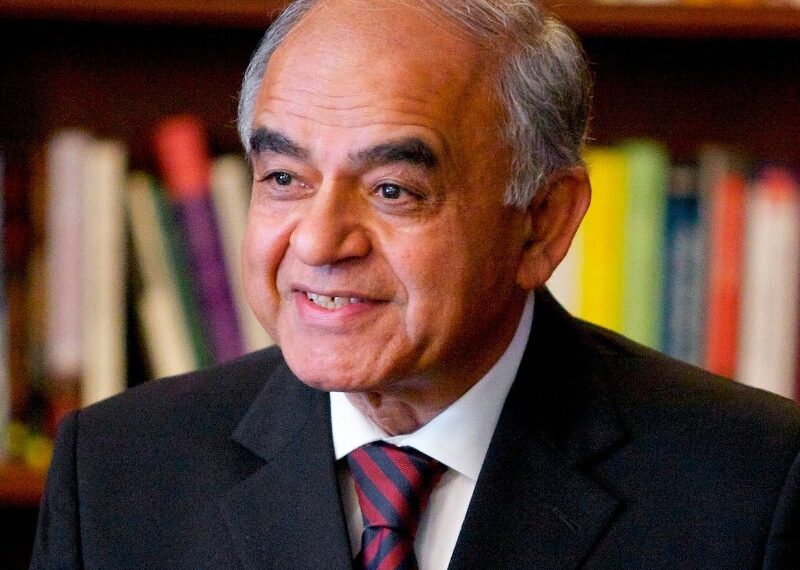Gurcharan Das is a prominent liberal thinker promoting individual freedom and free market economics. His critical analysis of inequality, socialism and the pursuit of fairness continues to shape India’s liberal discourse. This article narrates different ideas and viewpoints of Gurcharan Das through his works.
Gurcharan Das is an Indian author, liberal thinker, and acclaimed public intellectual known for his wise writings on various aspects, including economics, politics, culture, and society. He was born in Lyallpur (present-day Faisalabad, Pakistan) on October 3, 1943, and grew up in India after his family left following the partition.
Das attended Harvard University and had a successful career in business and management. He worked in various roles for several international organisations, including Procter & Gamble, which equipped him with a thorough awareness of the economic and corporate world.
His primary passion, however, was writing and contributing to India’s intellectual dialogue. He quit the corporate world in the late 1990s to pursue a full-time career as a writer and political pundit. He is now primarily considered a leading contemporary liberal author and commentator in India.
As a liberal figure, Das advocates for individual freedom, limited government intervention, and free-market economics. His book “India Unbound: From Independence to the Global Information Age,” published in 2000, is one of his critically praised works. Das provides a detailed account of India’s economic journey since independence, analysing the country’s transformation from a closed, socialist economy to an open, market-oriented one.
Some of his other influential works include “The Difficulty of Being Good: On the Subtle Art of Dharma,” which delves into the concept of dharma and its relevance in modern times, and “The Elephant Paradigm: India Wrestles with Change,” in which he reflects on India’s distinct cultural and historical identity in the face of globalisation.
In one of his articles titled “Worry about Opportunity, Not about Inequality”, Das explores the rhetoric of inequality, presenting a thoughtful perspective on economic inequality and its implications for India’s social and political landscape.
One of the key takeaways from the article is the recognition that the pursuit of absolute equality might be idealistic but impracticable. Human nature pushes us to seek fairness and justice, yet achieving complete equality in all facets of life is complicated.
The Russian Revolution of 1917 was a significant event in world history. Attempting to create an egalitarian society, the Bolsheviks aimed to overthrow the Tsarist monarchy from power. The idea was to establish a classless society that pledged equality and prosperity for all. The reality of pursuing absolute equality led to a series of failures that culminated in the collapse of the Soviet Union.
The Soviet Union in 1922 embarked on a program of central planning and state control over the economy. The measures initiated were the nationalisation of industries, agriculture collectivisation, and planned economy establishment. The results were production inefficiencies, shortages, and misallocation of resources.
India’s quest for economic equality during the Nehru era severely impacted the economy. Nehru’s socialistic tendencies hurt India economically. Between 1947 and 1990, the license raj was in place as a system of licenses and regulations to regulate the Indian economy and promote growth. However, it stifled the economy by creating bureaucratic red tape, making it difficult for businesses to operate. India missed out on opportunities for economic growth during this period.
Das is an ardent critic of socialist societies. He wrote, “If greed is the vice of capitalism, envy is the flaw of socialism”. The Soviet Union was plagued by envy, which arose more commonly between near equals than those widespread in fortune. As an egalitarian liberal, John Rawls said, “A person who envies another is prepared to make both persons worse off to reduce the gap between them.” Socialist societies not only produce envious citizens, but it also kills the hardworking instincts of their subjects. Thus, socialism ruins the fundamental human incentivisation of work, the reward.
Gurcharan Das presents a different viewpoint on inequalities and how societies accept inequalities. In his article, he writes, “We accept inequalities if we believe them to be fair”. A study conducted by the Pew Research Center in the United States Of America found that Americans are more likely to accept inequalities if they believe it is due to hard work and talent rather than luck or privilege. If the rich pay their taxes on time, create employment, and generate wealth for the nation, then the inequalities that rose during this process are justified. Figures reported by Oxfam International suggest the widening gap between the rich and the poor in India. The gap occurs mainly due to a lack of opportunity for the poor oppressed classes.
Das analysed the power shift in the 2014 general elections from a socio-economic perspective. While the UPA promised jobs for the unemployed, the general public was tilted in favour of the BJP, which promised to create 2 Crore jobs every year if it came to power. The difference here was that the UPA’s approach towards job creation was solely based on employment guarantee schemes, whereas the BJP promised jobs based on “Development”. This development included creating economic systems that allowed Individuals and Firms to pursue their interests in an enabling environment. Apart from employment creation, the BJP pledged to reduce corporate taxes and simplify the tax system. In short, the government was liberal in its approach towards complex issues such as unemployment, corporate taxation, economic growth and infrastructure improvement. While the government’s intent is positive, more must be done to fuel India in the right direction.
Das is also an ardent supporter of a robust education and healthcare system. Indeed, they are essential for individual development and the overall well-being of a nation. A robust education system provides the knowledge and skills to improve employment opportunities. A robust healthcare system ensures universal access to quality healthcare, providing people with proper facilities to stay healthy and lead productive lives. Education and Healthcare are thus powerful tools to reduce inequalities because of their potential to level the playing field for everyone. As both sectors play a decisive role in shaping the life of citizens, the State must play an enabling role to ensure the delivery of Progressive Education and Quality healthcare services. Education and Healthcare essentially provide the environment for equality of opportunity.
Gurcharan Das’s writings and his liberal ideas have profoundly impacted India’s intellectual landscape. His staunch advocacy for individual freedom and equal opportunities has left a legacy for young thinkers to follow. Through critical analysis of issues and events, he challenges societies to seek pragmatic solutions that prioritise individual growth and fairness.
References
-
-
- Das, G. (2014, June 1). Modi’s moment is about middle class dignity. Times of India Blog. https://timesofindia.indiatimes.com/blogs/men-and-ideas/modis-moment-is-about-middle-class-dignity/
- India: extreme inequality in numbers | Oxfam International. (2022, September 9). Oxfam International. https://www.oxfam.org/en/india-extreme-inequality-numbers
- Mitchell, T. (2020, January 9). 2. Views of economic inequality. Pew Research Center’s Social & Demographic Trends Project. https://www.pewresearch.org/social-trends/2020/01/09/views-of-economic-inequality/
-
Previous musing: Dr Muthulakshmi Reddi: Beacon of Women’s Liberty


